15 Surreal Landscapes Of America Too Beautiful for Photos

Imagine stepping into a world where the landscapes look like they’ve been plucked straight out of a dream or a sci-fi movie. No need to pinch yourself; these surreal landscapes of America are very much real, and they’re waiting to make your jaw drop.
Expect to hike into fiery red canyons, wander through alien-like deserts, and get lost in forests and rock formations that defy the imagination. I spent two years living the van life, exploring the wild west of the United States, and these are some of my favorite locations that seem almost like they’ve been crafted by a digital artist’s hand.
1. Antelope Canyon, Arizona
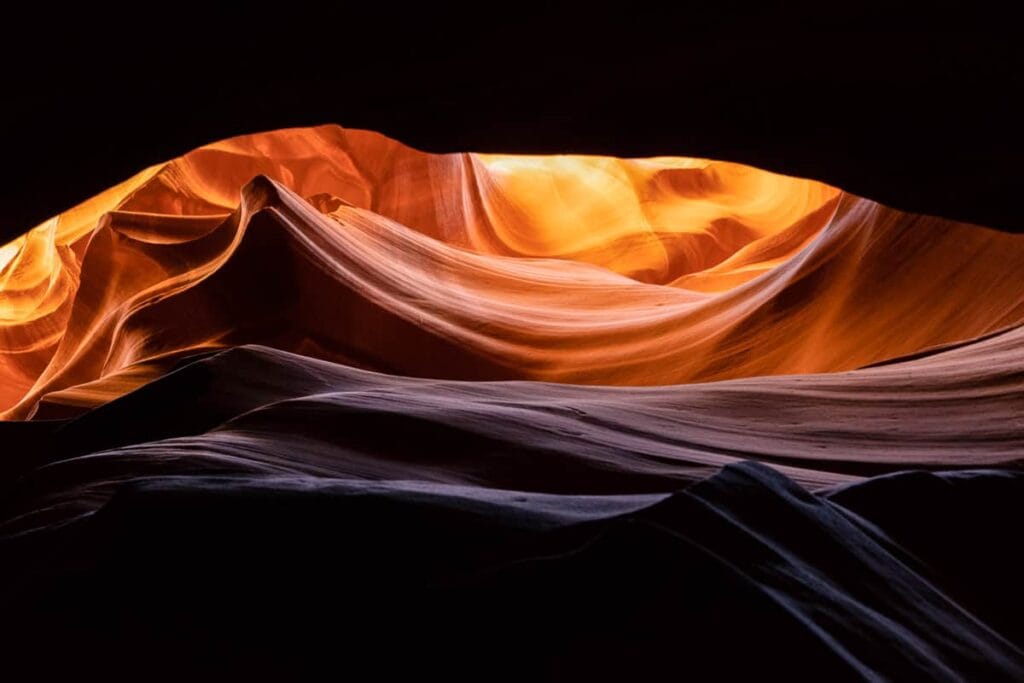
Antelope Canyon is one of nature’s most impressive masterpieces, featuring swirling sandstone walls in a towering corridor of fiery reds and oranges. It had been on my bucket list for years, and I promise that the real thing is somehow even better than what you’ve seen online.
Located in the Navajo Nation near Page, Arizona, Antelope Canyon is actually divided into 6 separate sections (2 being the most photogenic): Upper Antelope Canyon and Lower Antelope Canyon. Visitors flock from around the globe to witness the light beams that pierce through the narrow crevices, a phenomenon that occurs especially during the summer months at noon.
How to Visit: To experience Antelope Canyon, you must book a guided tour, as it’s located on protected Navajo land. Tours typically last around 1.5 to 2 hours, and spots fill up quickly, especially during peak season!
2. Bisti Badlands, New Mexico
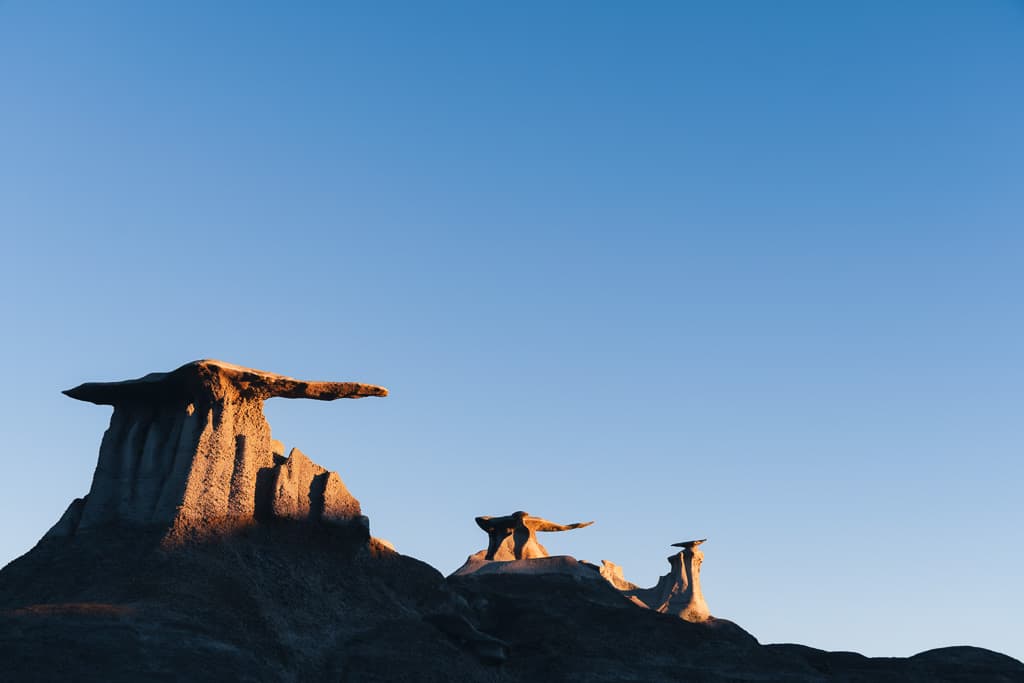
I’m not sure I’ve ever felt as much like I was on another planet as I did at Bisti Badlands in New Mexico. The otherworldly landscape of the badlands, with its hoodoos and bizarre rock formations, will make you feel like you’ve stepped onto Mars.
The area is known for its fossils and dinosaur bones from the Late Cretaceous period. It’s also home to incredible geological features like the “Cracked Eggs,” which are large spheres that have been split open to reveal their colorful insides.
How to Visit: The Bisti Badlands is fairly remote, about 36 miles south of Farmington, New Mexico. Head south on NM 371 from Farmington, then turn east on CR 7297 (also known as Bisti Access Road). Continue for around 2 miles until you reach the gravel parking area. There’s no official trail system, so freely wander through the maze-like terrain—just bring a GPS or map to navigate.
3. Hamilton Pool Preserve, Texas
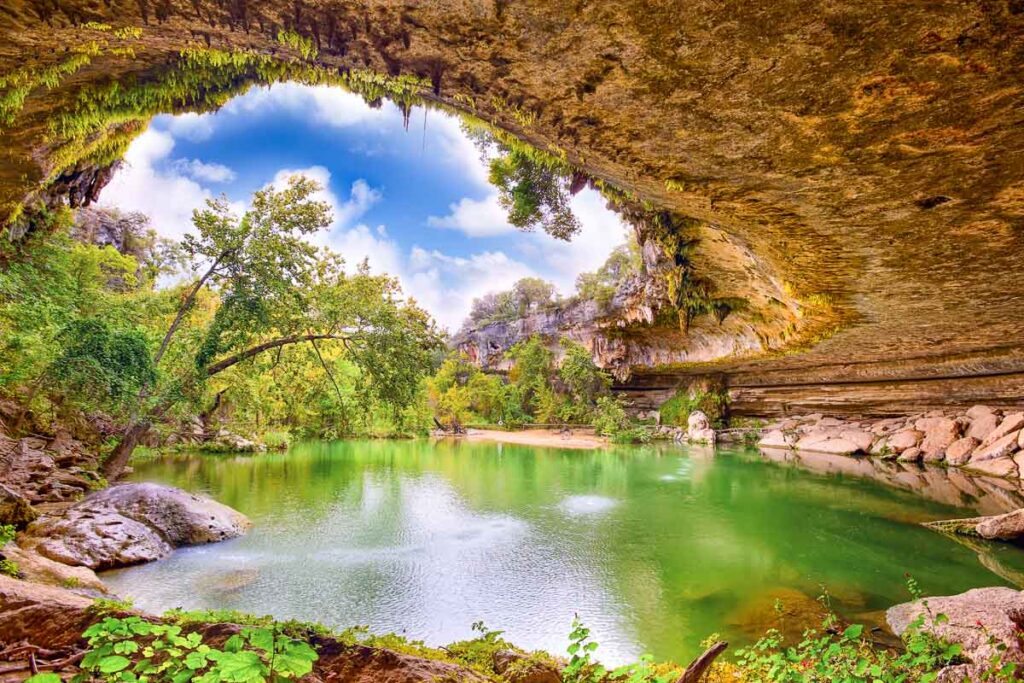
You might think you’ve stumbled upon a cenote in a tropical paradise in the heart of Texas when you visit Hamilton Pool Preserve. This natural pool is about an hour outside of Austin and was formed thousands of years ago when the dome of an underground river collapsed.
With the collapse came a stunning swimming hole surrounded by lush greenery, cascading waterfalls, and even a small beach area! Due to its popularity, reservations are required to visit and access may be limited during heavy rainfall or drought conditions.
How to Visit: Reservations can be made online through the Travis County Parks website. Due to high demand during peak season (May-September), make reservations as soon as possible.
4. The Wave, Arizona/Utah Border
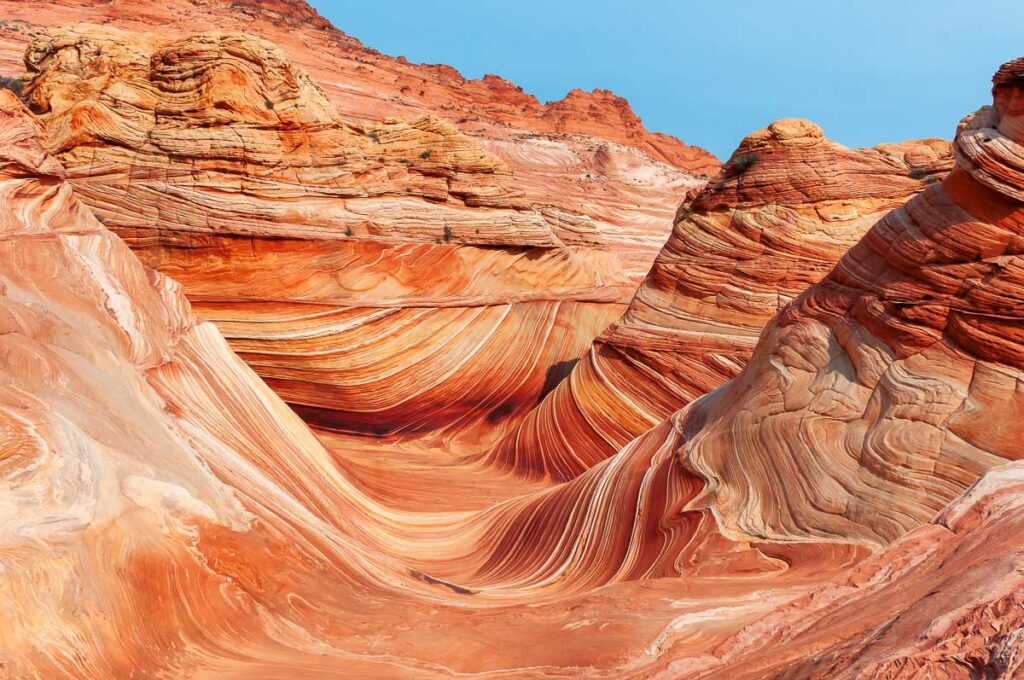
The Wave is an ultra-smooth rock formation in the Paria Canyon-Vermillion Cliffs Wilderness near the Arizona and Utah border. Its surreal, swirling patterns of red and orange are the result of millions of years of erosion on the Navajo Sandstone.
The round trip is approximately 6 miles (10 kilometers) and takes 3 to 4 hours to complete on a largely unmarked path. Due to its fragile nature, The Wave has limited access, with only 64 people allowed per day. A permit is required to enter, which can be difficult to obtain. Trust me, I’ve tried twice.
How to Visit: Permits are issued through an online lottery system and typically booked months in advance. A few permits are also available through last-minute lotteries the day before.
5. Trona Pinnacles, California
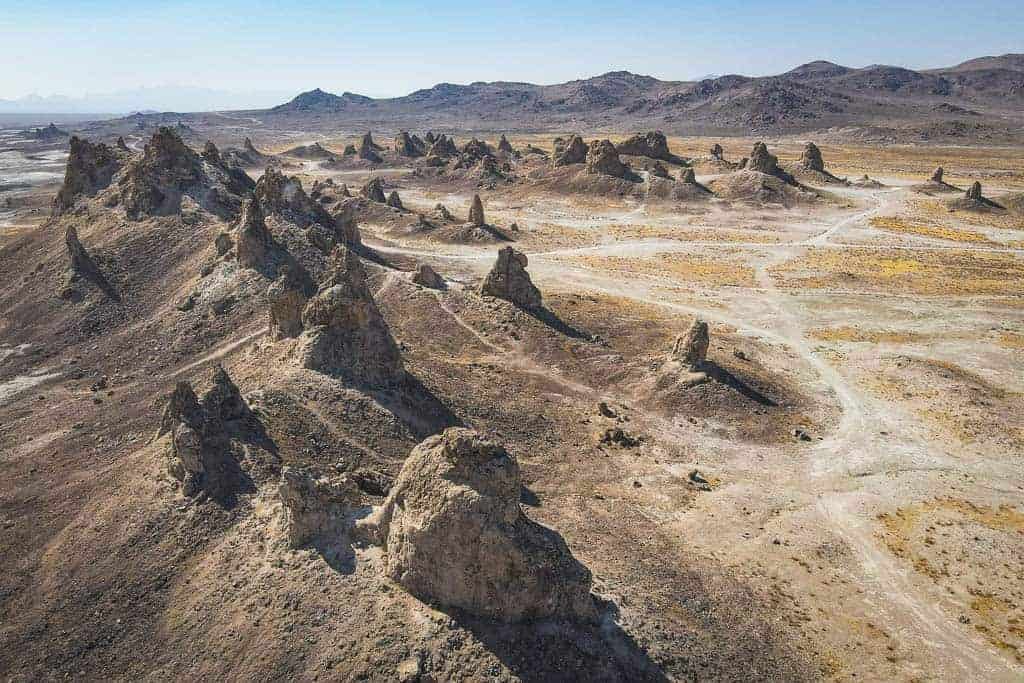
The Trona Pinnacles in California look like something straight out of a science fiction movie. And it literally is as it’s been featured in films like Planet of the Apes and Star Trek.
These unique formations are made up of over 500 tufa (calcium carbonate) spires, some reaching up to 140 feet tall. The pinnacles were formed thousands of years ago when underwater springs deposited minerals that accumulated into the alien-like structures we see today.
How to Visit: The Trona Pinnacles are located on BLM land, about 20 miles east of Ridgecrest, California. There is no official trail or marked paths at Trona Pinnacles, but you can drive along some dirt roads to get closer to the formations. No facilities or services are nearby, but you can freely boondock here.
6. Monument Valley, Arizona/Utah
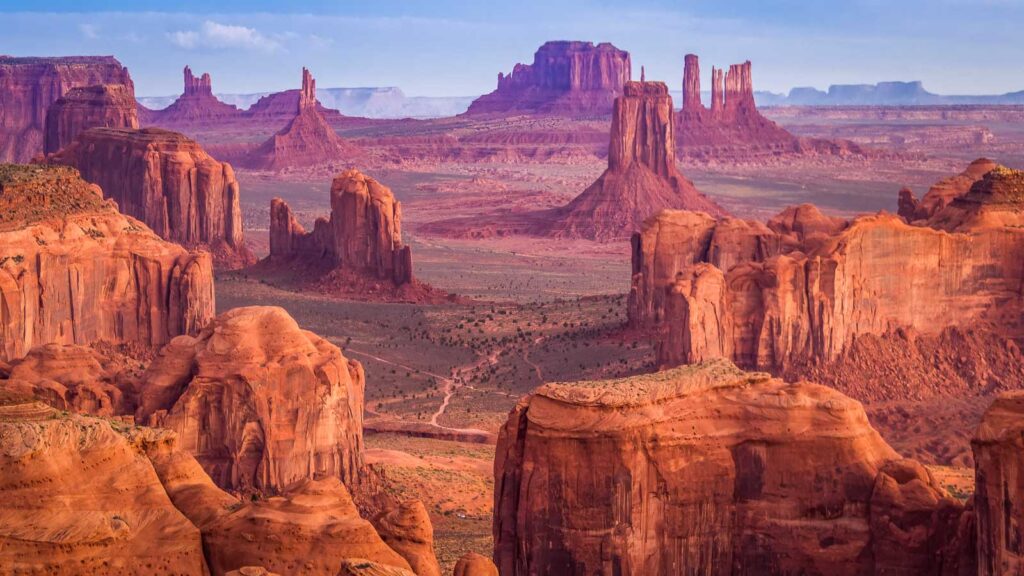
Monument Valley is like stepping into every Western movie you’ve ever seen. On Navajo Nation reservation land straddling the Arizona-Utah border, this otherwise flat landscape features towering sandstone buttes that rise up to 1,000 feet.
Driving through the valley on the 17-mile scenic loop feels like you’re on an epic road trip through Mars. You’ll need to get a guided tour through the Navajo Tribal Park to visit. While you do, you’ll see the “Totem Pole” formation and the aptly named “John Ford’s Point,” where the famous director shot many of his classic films.
7. Devil’s Tower, Wyoming
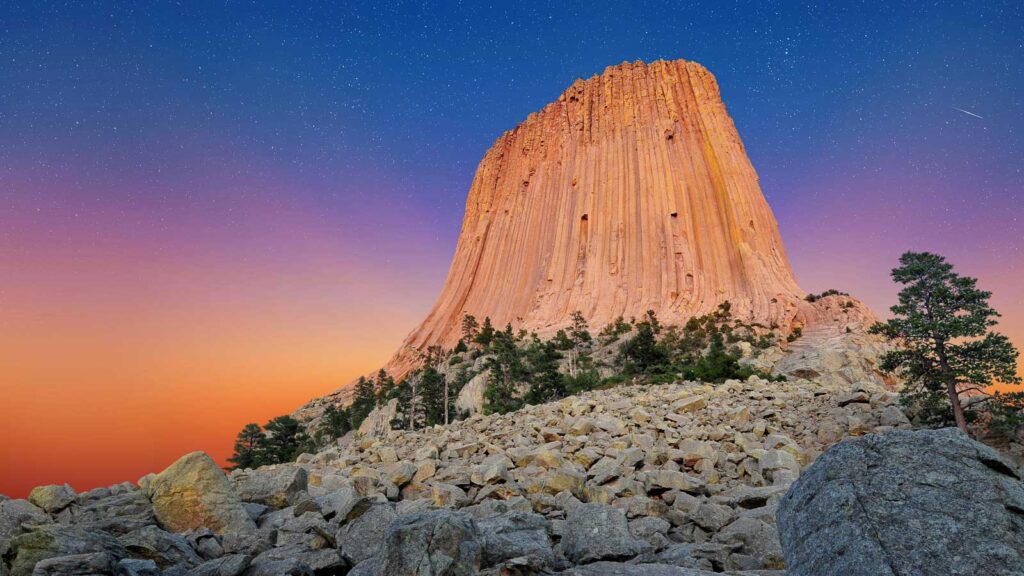
Devil’s Tower in Wyoming is one of those places that make you question reality. Standing 867 feet tall, this peculiar monolith shoots straight up out of the prairie as if placed there by aliens.
Rock climbers flock here to tackle its challenging vertical face, while the rest of us can enjoy the easier, though equally impressive, 1.3-mile Tower Trail loop. The surrounding parkland is home to prairie dogs who seem to have an endless supply of energy for popping in and out of their burrows. Native American tribes consider it sacred, calling it Bear Lodge.
8. Alabama Hills, California
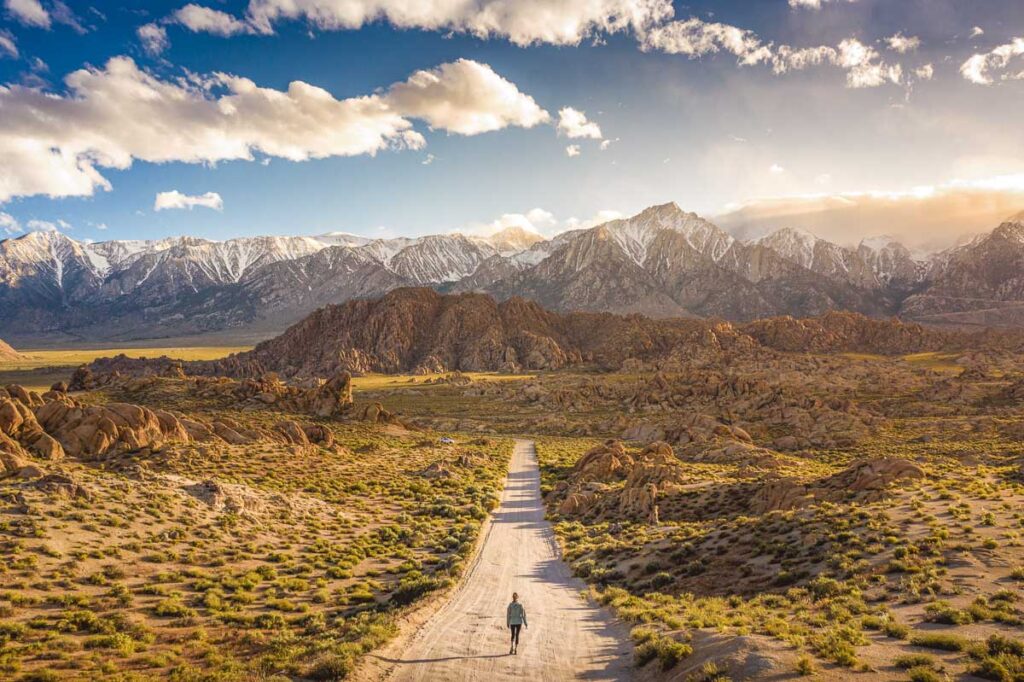
With its rounded boulders and jagged peaks, Alabama Hills has been the backdrop for countless films and TV shows. The main road through the area is even named Movie Flat Road.
Besides spotting the locations from your favorite Westerns, you can also hike and boondock freely in this otherworldly landscape as its on BLM land. Take the Mobius Arch Loop Trail to see the famous rock arch framing Mount Whitney, the tallest mountain in the contiguous United States. The area is crisscrossed with dirt roads perfect for off-roading adventures and discovering hidden gems.
9. Painted Hills, Oregon
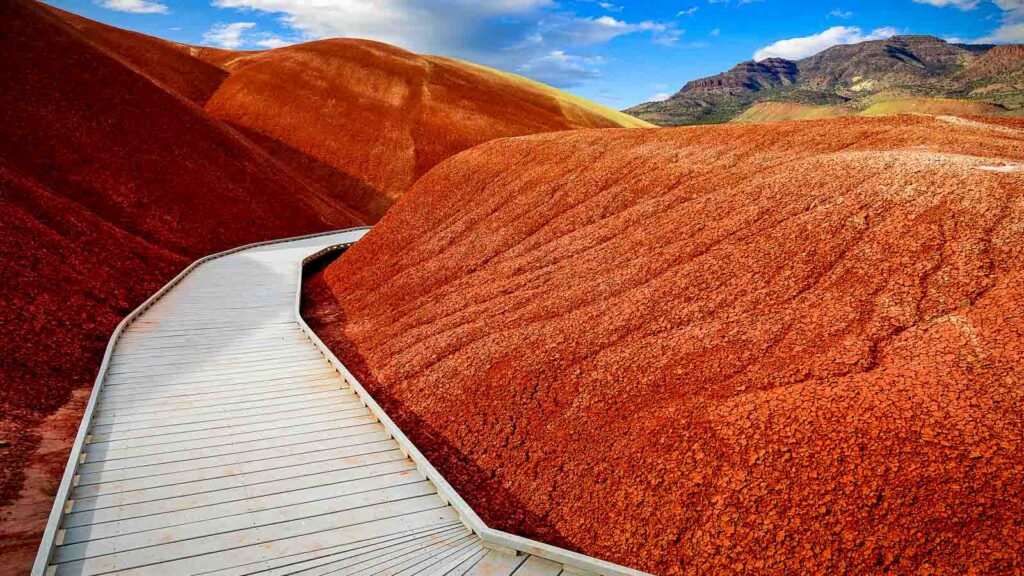
Part of the John Day Fossil Beds National Monument, the Painted Hills in Oregon are layered with bright hues of red, gold, black, and orange. The best way to experience this technicolor wonderland is by taking the Painted Hills Overlook Trail. You can also walk the boardwalk that cuts through the hills. The colors shift with the light and weather, so every visit feels like a new discovery.
10. Bonneville Salt Flats, Utah
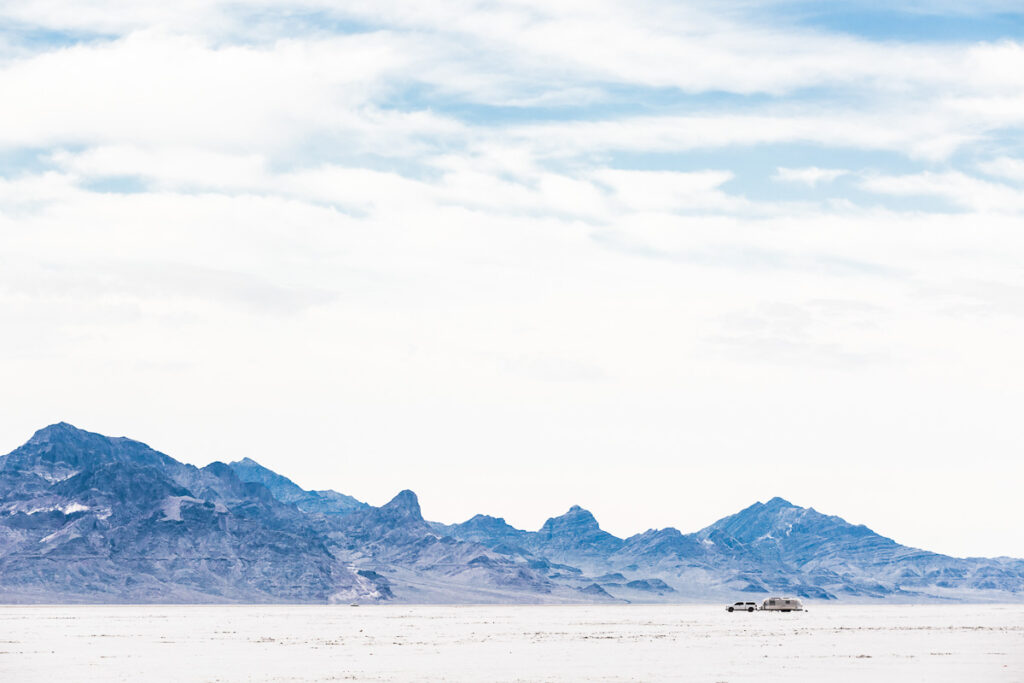
The Bonneville Salt Flats are a photographer’s dream. With their vast salty horizon, they rival the famous Uyuni Salt Flats in Bolivia. The flat expanse of white salt stretches for over 30,000 acres and is located just outside the small town of Wendover, Utah.
It’s not unusual to see cars racing at high speeds on the salt flats, as it’s known for being one of the fastest tracks in the world. You may even see artists creating elaborate sculptures and designs using the salt crystals if you’re lucky.
How to Visit: The best time to visit is during the summer months when the salt is dry and solid enough to walk on. However, when there’s water, it makes a perfect beautiful reflection. Be sure to bring sunglasses and sunscreen, as the reflection from the salt can be blinding!
11. Grand Prismatic Spring, Wyoming
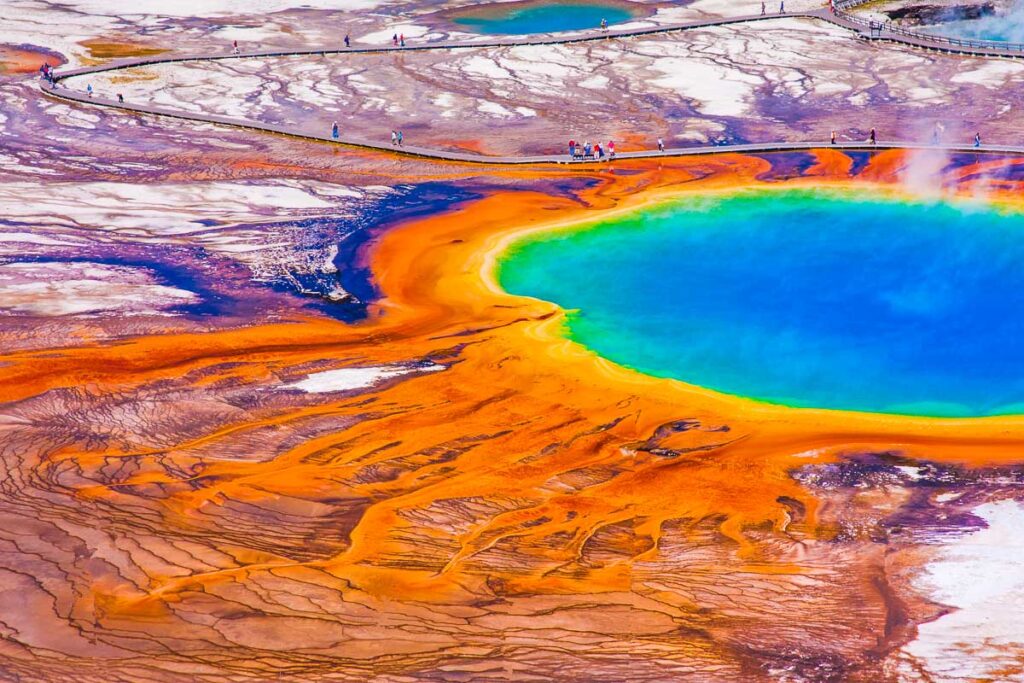
Grand Prismatic Spring is the largest hot spring in the United States and one of the most colorful natural wonders. As one of the most popular attractions in Yellowstone National Park, it’s known for its vivid rainbow hues created by different types of bacteria that thrive in the hot water.
How to Visit: There are two ways to experience Grand Prismatic Spring: one from above and one from the boardwalk trail. The aerial view requires a hike up nearby Fairy Falls trail to give you gorgeous views of the multicolored pool from a higher angle. While the boardwalk trail starts at the starts at the Midway Geyser Basin parking lot for a closer look at the spring and its colors.
Travel Tip! Stay on the boardwalk and follow all safety regulations, as the hot springs are extremely dangerous.
12. Fossil Falls, California
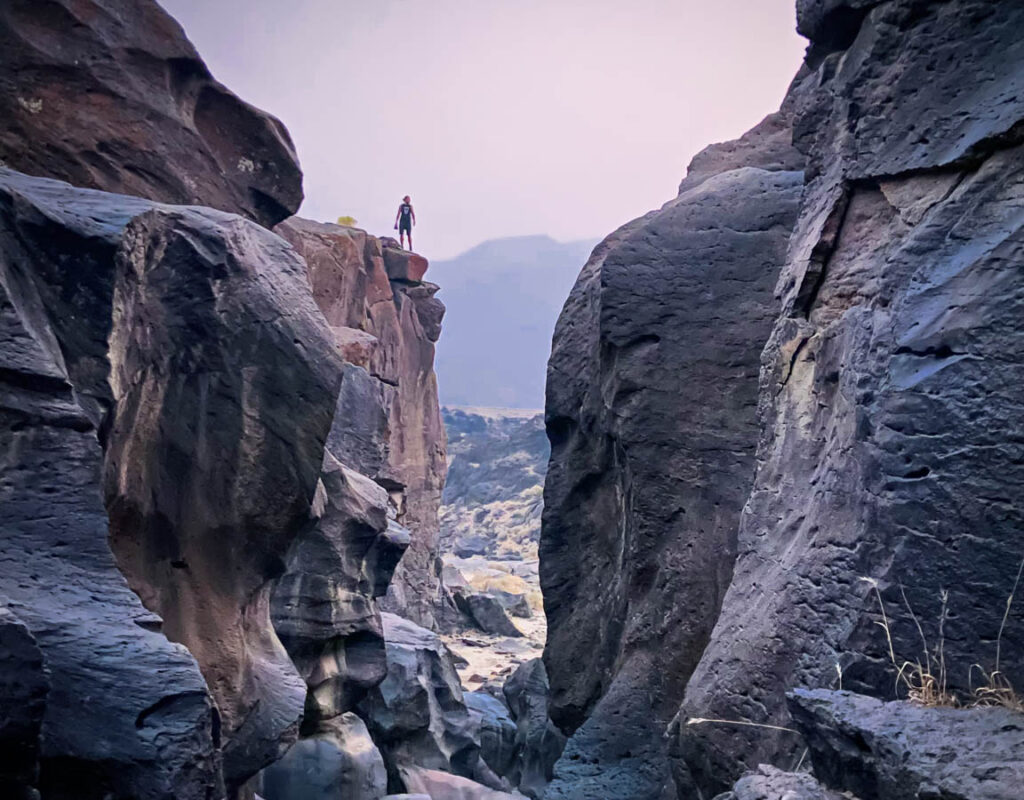
Fossil Falls in California covers several thousands of acres and includes incredible lava sculptures, deep gorges, and striking rock formations.
The main attraction is a stark, ancient black lava field formed over 20,000 years ago when the Owens River ran through the volcanic rock, creating a 30-foot polished lava structure. One fun fact about Fossil Falls is that it’s not actually a regular waterfall but is made up of striking formations created by past glacial meltwaters.
How to Visit: Fossil Falls is off U.S. Highway 395, about 45 minutes south of Lone Pine. Follow the signs to Fossil Falls Road from the highway and take the short hiking trail to the site. There’s a parking lot nearby, but wear sturdy shoes, as the terrain is really rocky!
13. White Sands National Park, New Mexico
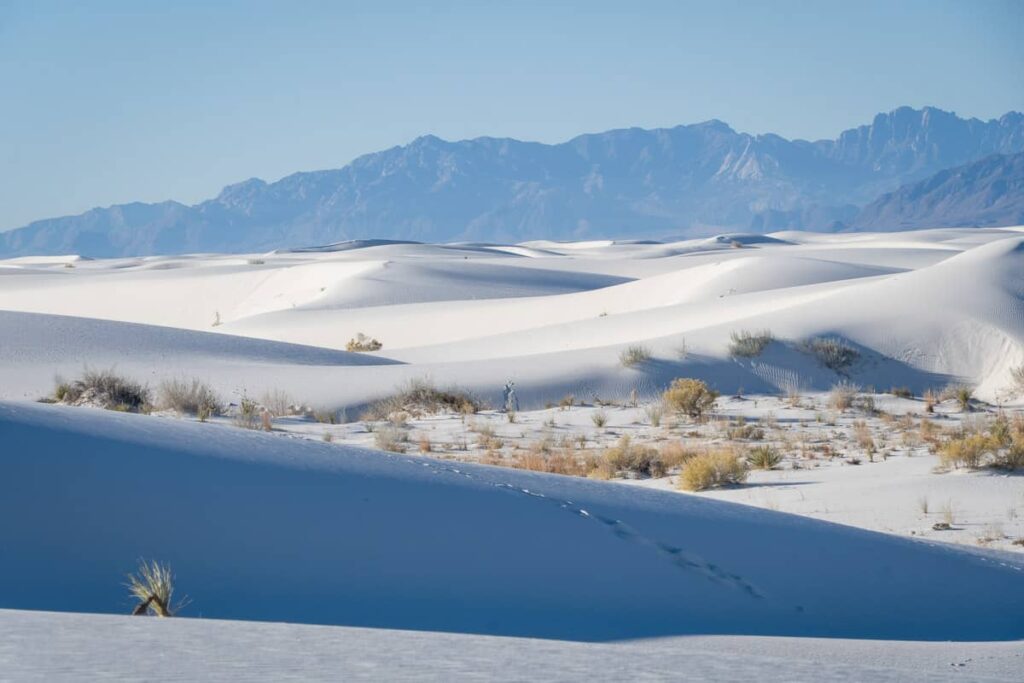
Imagine a place where the desert isn’t golden-brown but bleach-white as far as the eye can see. White Sands National Park in New Mexico is home to the world’s largest gypsum dune field, covering a whopping 275 square miles. Dunes rise up to 60 feet and constantly shift and change shape with the wind.
Trek across the dunes on a network of hiking trails, including the popular Alkali Flat Trail. For a unique experience, try sand sledding down the steep dune faces (just bring or rent a sled from the visitor center). And if you’re a photography buff, the everchanging dunes provide a perfect backdrop for capturing mesmerizing shots, especially during sunrise or sunset.
How to Visit: White Sands National Park is about 15 miles southwest of Alamogordo, New Mexico. You can enter the park via U.S. Highway 70. Once you arrive, drive along the scenic Dunes Drive to find parking. A $25 entrance fee per vehicle is required for admission. Note that temperatures can reach over 100 degrees Fahrenheit during the summer months.
14. Bryce Canyon’s Hoodoos, Utah
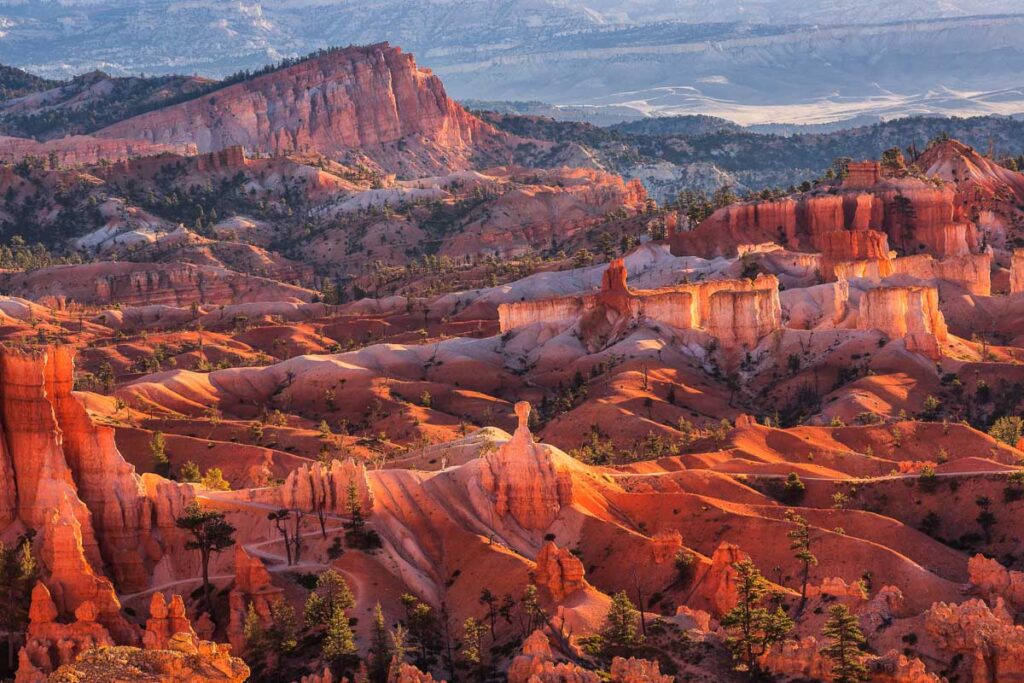
Bryce Canyon National Park in Utah has the largest collection of hoodoos in the world. These rock spires, or “fairy chimneys,” can rise up to 200 feet in height. Hoodoos are formed through a combination of frost wedging and rain erosion, crafting intricate shapes over millions of years. The park’s pièce de résistance is the Bryce Amphitheater, an awe-inspiring natural amphitheater filled with these towering formations.
A Bryce Canyon itinerary would include hiking one of its many trails, such as the Navajo Loop and Queens Garden trails, which are particularly popular. If you’re a photography lover, aim to be there during sunrise or sunset when the hoodoos glow in shades of orange, pink, and red.
How to Visit: Bryce Canyon National Park is located in southern Utah and is accessible via Highway 12. Entrance fees are $35 per vehicle for a 7-day pass. Shuttle services operate from April to October, providing convenient access to the park’s main viewpoints and trailheads.
15. Crater Lake, Oregon
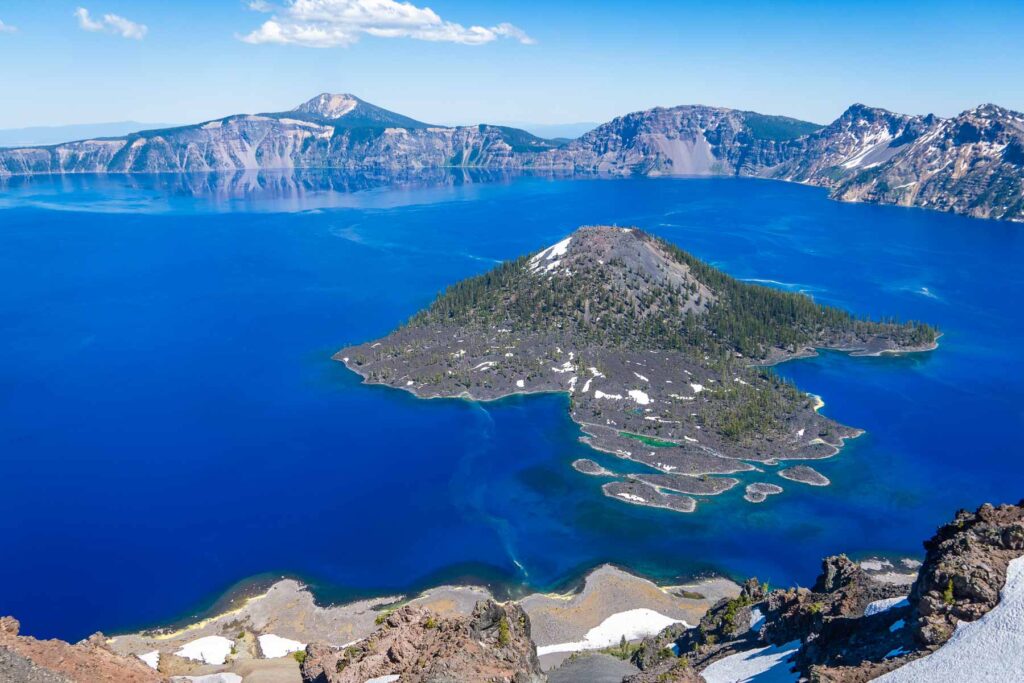
Crater Lake is not just any lake; it’s the deepest lake in the United States, plunging to a mind-boggling depth of 1,949 feet. This vibrant blue gem, located in the caldera of a destroyed volcano, Mount Mazama, is surrounded by cliffs almost 2,000 feet high.
Formed around 7,700 years ago following a massive eruption, Crater Lake is fed almost entirely by snow and rain, making it one of the clearest lakes in the world. It has no inlets or outlets, and its water level is maintained solely by precipitation.
While at Crater Lake, ride the full Rim Drive, a 33-mile scenic road that circles the caldera and offers numerous overlooks and picnic spots that are only open in summer. Take the boat tour to Wizard Island, a cinder cone that rises 763 feet above the lake’s surface.
How to Visit: Crater Lake is open year-round, but road closures in winter make it tricky to visit the winter due to snow. During peak season, from July to mid-September, the park offers boat tours that allow visitors to explore the lake up close. Entrance fees are $30 per vehicle during the summer months and $20 during the winter.
Catherine, a seasoned travel writer, has lived in 4 different states and explored 36 states and 28 national parks. After spending two years embracing van life, she's now dedicated to sharing her vast knowledge of day trips across America. Catherine's other works has been referenced in major publications like MSN, Self, and TripSavvy.
| MY FAVORITE TRAVEL RESOURCES |
✈️ Find amazing guided tours and experiences with Viator to maximize your time! 🏘️ Plan ahead and secure your accommodation with Booking.com in advance. 🧾 Rent a car with Discovercars in advance and get the best prices for your day trip adventures. |

